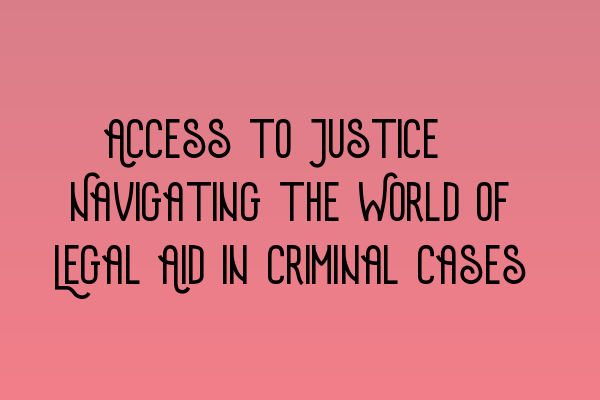Access to Justice: Navigating the World of Legal Aid in Criminal Cases
When facing criminal charges, it is crucial to have access to quality legal representation. However, the cost of hiring a lawyer can be exorbitant, leaving many individuals at a disadvantage. This is where legal aid comes in.
Legal aid provides financial assistance to individuals who cannot afford the services of a lawyer. It ensures that everyone, regardless of their financial situation, has equal access to justice. In criminal cases, legal aid plays a crucial role in protecting the rights of the accused, as well as ensuring a fair and unbiased legal process.
Understanding Legal Aid in Criminal Cases
Legal aid is governed by the Legal Aid, Sentencing and Punishment of Offenders Act 2012 (LASPO). Under this legislation, individuals facing criminal charges may be eligible for legal aid if they pass the means test and if the case meets the legal aid merits test.
The means test assesses an individual’s financial circumstances to determine their eligibility for legal aid. It takes into account factors such as income, savings, and assets. The merits test, on the other hand, evaluates the seriousness of the case and the likelihood of success.
It is important to note that not all criminal cases qualify for legal aid. Some less serious offenses may not meet the merits test, resulting in individuals having to finance their own legal representation. This highlights the need to understand the eligibility criteria and the available options.
Navigating the World of Legal Aid
Navigating the world of legal aid can be complex and overwhelming. However, with the right guidance and resources, individuals can ensure they make informed decisions regarding their legal representation.
One useful resource is the SQE Criminal Law & Practice Law UK. They offer comprehensive guidance on all aspects of legal aid, criminal law, and practice. Their team of solicitors understands the intricacies of the legal system and can provide expert advice to those in need.
If you are preparing for the SQE examination or looking for practice exam questions, the SQE 1 Practice Exam Questions article can be a valuable resource.
For SQE 1 or SQE 2 preparation courses, you can explore the SQE 1 Preparation Courses and SQE 2 Preparation Courses articles for more information on how to enhance your knowledge and improve your chances of success.
Stay Updated with SRA SQE Exam Dates
As the legal landscape evolves, staying updated with the latest information is crucial. The Solicitors Regulation Authority (SRA) regularly releases SQE exam dates. Being aware of these dates can help individuals plan their preparation and ensure they are well-prepared for the examination.
If you want to stay informed about the upcoming SRA SQE exam dates, check out the SRA SQE Exam Dates article and mark your calendar accordingly.
Conclusion
Access to justice is a fundamental right that should be available to all individuals, regardless of their financial situation. Legal aid plays a crucial role in ensuring equal access to quality legal representation in criminal cases. By understanding the eligibility criteria and navigating the world of legal aid effectively, individuals can defend their rights and receive a fair legal process.
For more information and expert guidance on legal aid, criminal law, and practice, visit SQE Criminal Law & Practice Law UK. Stay prepared with practice exam questions,
practice mocks, and comprehensive preparation courses.
